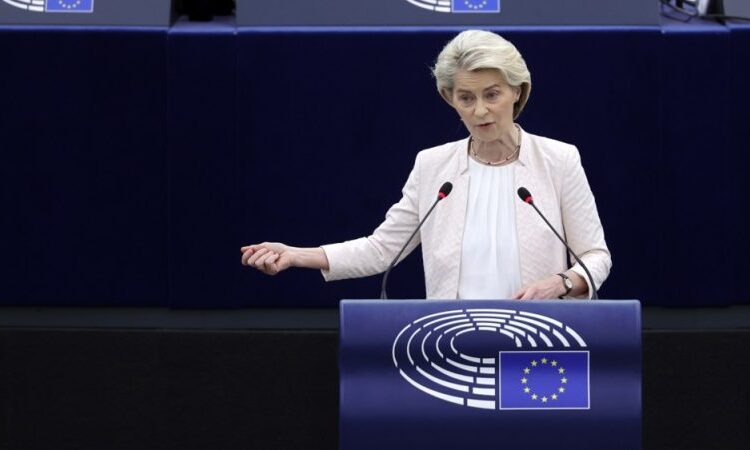
Ursula von der Leyen walked a fine line in her speech to the European Parliament plenary on Thursday (18 July), signalling support for an enlarged EU budget and looser competition rules whilst remaining vague enough to appease both sides of the political spectrum.
In a speech delivered in Strasbourg just hours before a vote on her re-election as Commission president, von der Leyen strongly implied that she would support a larger budget, something national politicians are widely divided on as fiscally ‘frugal’ countries such as Germany point to the lack of efficiency in existing programmes and call for budget funding to be reformed rather than expanded.
Von der Leyen noted that the “NextGenerationEU” post-pandemic joint borrowing programme, initially consisting of around €800 billion, will end in 2026, but Europe’s “investment needs will not”.
“We need more investment capacity,” von der Leyen said, adding: “Our new budget will be reinforced.”
This echoes her message in the guidelines outlining her political priorities published shortly before her speech, where von der Leyen added that the new budget would require “strengthened and modernised revenues”.
She also wrote that “new own resources will be needed to ensure sufficient and sustainable financing for our common priorities” but didn’t elaborate on what these resources will consist of.
The EU budget should “be more focused on policies, simpler for Member States and more impactful so that we use its power to leverage more private and public financing,” she said.
Von der Leyen specifically called for a “European Competitiveness Fund” to crowd in private investment and complement a “Clean Industrial Deal” to boost green manufacturing across the bloc.
She said the latter Deal – a revamped version of the previously much-discussed Industrial Deal – will be presented “in the first 100 days” of her term.
The new Fund would invest in strategic technologies—from AI to space, clean tech to biotech—to strengthen the bloc’s strategic autonomy.
Notably, von der Leyen stressed that the Fund will be aimed at “ensur[ing] that we use the power of our budget to leverage and de-risk private investment in our common goals.”
Von der Leyen also said the budget will be linked to reforms and continued respect to the rule of law.
“We will keep to a very clear principle in our budget. Respecting the rule of law is a must for EU funds. In this budget, and the future, with the conditionality mechanism, it is non-negotiable. Because this is the core of our European way of life,” she said.
Meanwhile, on competition policy, she emphasised the need to “support companies to scale up”—echoing a Franco-German push to enable the emergence of “European champions” that can compete with global peers.
This would mark a shift in priorities from outgoing competition chief Margrethe Vestager’s long-standing emphasis on ensuring intra-EU competition – which during her term resulted in blocking some high-profile merger plans, most notably a planned merger by French train manufacturer Alstom with Siemens in 2019.
Less burden, more housing
Von der Leyen also heavily emphasised the importance of reducing companies’ administrative burden: “We need less reporting, less bureaucracy, and more trust, better enforcement, and faster permitting.”
Von der Leyen noted that she would ask each of her future Commissioners to perform a “deep dive in their portfolio and deliver concretely on burden reduction”.
She also reiterated previous calls to deepen the single market, and in particular proposed the creation of a “Savings and Investment Union” – a rehashed name for the Capital Markets Union drawn from a recent report by former Italian Prime Minister Enrico Letta.
Von der Leyen also said that she would appoint a commissioner “with direct responsibility for housing” to oversee the development of a “European Affordable Housing Plan”, with a view to involving the public and private sectors in addressing the current crisis.
“Typically, housing is not seen as a European issue,” she said. “Some might say we should not get involved. But I want this Commission to support people where it matters the most. If it matters to Europeans, it matters to Europe.”
[Edited by Alice Taylor]







